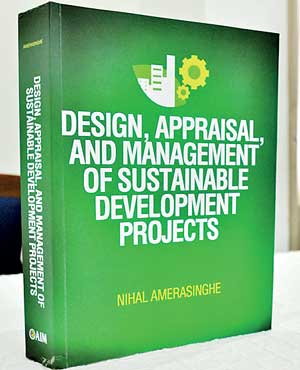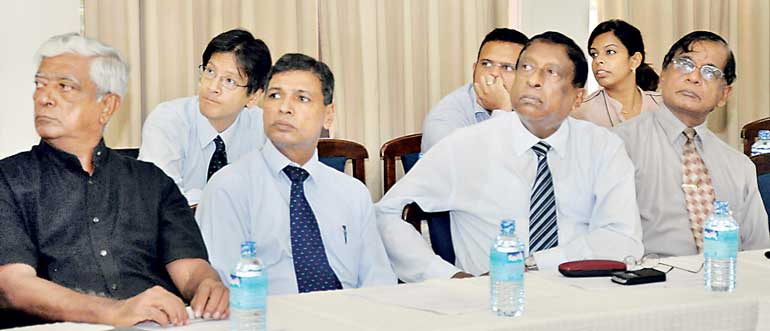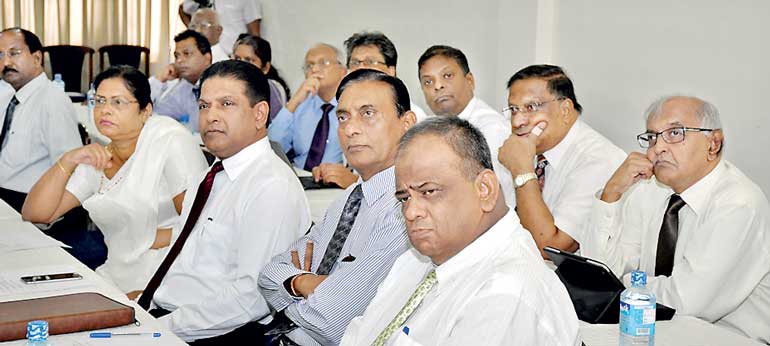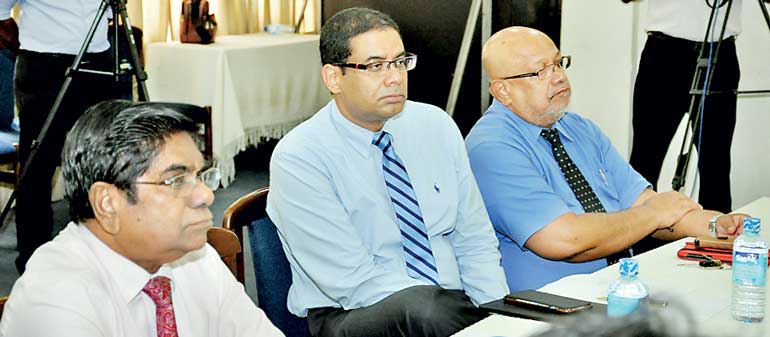Saturday Feb 14, 2026
Saturday Feb 14, 2026
Wednesday, 22 July 2015 00:00 - - {{hitsCtrl.values.hits}}

By Senuri de Silva
Private and public sector stakeholders gathered at the Postgraduate Institute of Management last week for a round table discussion based on the new book by Professor Nihal Amarasinghe.
Professor Amarasinghe took his guests on a guided tour of his latest work; Design, Appraisal, and Management of Sustainable Development Projects. The most special feature of the book is that it gathers his experiences on every aspect of the project planning process in one comprehensive volume. 
This unique compilation also promises its readers a standard of knowledge and expertise that is similar to a Masters in Development Management as it contains ‘tried and tested’ subject matter that has been taught by the professor in his classroom for the last 10 years. It also captures his experiences managing over 150 projects for the Asian Development Bank.
Speaking about what inspired him to put this book together he said, “There is no book in the market today which walks you through what a project is, how a project has evolved over the last 70 years, how you identify projects and what are the dos and don’ts when you identify a project,” further describing the five main parts of the book that deal with project development, identification and design, feasibility and approval, implementation and control, completion and evaluation.
Readers will also find a very special discussion on the evolution of project management which is an original evaluation by the professor himself. It promises to be a very insightful and analytical discussion on the different development agendas of the country during the pre-colonial era and how much this has changed since the gaining of independence because, ‘Until we got our independence we were not in a position to choose our development process’.
It also discusses the evolution from millennial development goals to sustainable development goals and the manner in which projects have shifted from being output based to impact based stating that, “Projects are for people.” Therefore the value of a project is no longer based on simply its output but on the positive impact it makes on the lives of as many people as possible.

Approval from the experts
Asian Development Bank Country Director Sri Widowathi shared her experiences with the ADB and illustrated the importance of the various stages in project management that are discussed in Professor Amarasinghe’s Design, Appraisal and Management of Sustainable Development Projects. “Steps taken prior to implementation are important to ensure the success of any project,” she said further referencing the comprehensive account of the project cycles that are also discussed in Professor Amarasinghe’s new book.
The Colombo port project and the southern highway project are two of the more recent projects that the ADB has been involved in that she used to illustrate her point. “One was a problematic project and the other was relatively smooth,” she said comparing the outcome of these two projects. The reasons for this, as she described, could be found in the different approaches taken during the earliest stages of the project in the planning preparatory work that led up to the it.

The Colombo port project which began after over six years of preparatory work had been completed smoothly. The southern highway project on the other hand had required additional funding as well as additional time before it was completed due to the poor planning that went into it.
However on a positive note she also added that the lessons learnt from these projects have changed the culture of the agencies carrying them out as they draw up new project ideas backed with the proper preparatory work to ‘reduce unnecessary delay and cost overrun’.
Dr. Fredrick Abeyratne who also spoke at this event pointed out a number of areas in the project planning process that needed to be improved on with regard to the various stages of project management.
While development plans were once closely connected to mainstream department work they are now mostly project based. Therefore the importance of project management is directly connected to development of the country. For this reason, it needs to be surrounded by systems that are in place to ensure public accountability and to achieve outcomes.

Poor assessment of needs
One issue that Dr. Abeyratne identifies is the poor assessment of needs in project identification as, ‘large development projects are pet projects of authorities’. As a result, more projects need to be based on needs assessment. In addition to this, projects funded by foreign aid tend to be based on ‘foreign agendas’ which are not necessarily a bad thing but they may not be in line with the mainstream development plans of the country. As a result they may create poor results in terms of its outcome.
Apart from this too many projects are output based. Dr. Abeyratne brought up examples of many projects that end up as ‘abandoned buildings.’ While they may have created an output it has not been translated to an outcome in terms of benefits for the public as Dr. Abeyratne questioned, “How much of these outputs have contributed to the lives of people?”

One of the root causes of this issue is the fact that lessons learnt from evaluations is not being factored in as the cause of this problem as ‘we go on making the same mistakes’. Furthermore past projects are not being factored into new projects and little heed is paid to uncertainties as too many decisions are based on the presumption that ‘the systems are lenient’ and without taking into account factors such as change in governments, fluctuation of exchange rates and climate change. The problem is further aggravated by the fact that ‘appraisals are done to justify decisions already taken’.
He suggested that there should be a repository of evaluations that are maintained with updated information so that they can be referenced and research can take place to expand this field further.
He also spoke on the private sector involvement in larger projects, saying that little attention was paid to the triple bottom line with regard to these projects. Economic concerns for example are only limited to financial concerns and while social concerns may be limited to a few CSR projects almost no concern was given to environmental concerns.
Pix by Lasantha Kumara